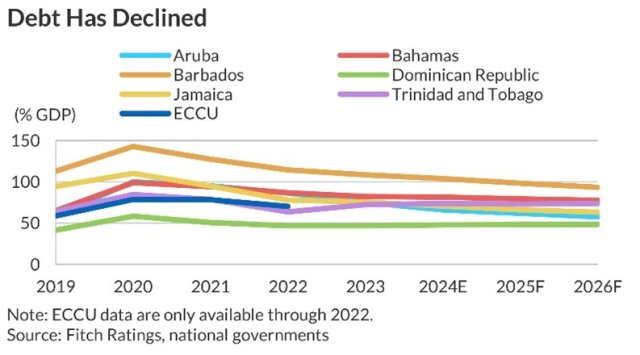The Fitch Report highlights Aruba's robust economic progress and commitment to fiscal reform.
ORANJESTAD— Aruba has garnered international recognition for its economic and financial advancements, as highlighted in a new report by Fitch Ratings titled "Caribbean Credit Profiles Improve, but Structural Challenges Remain."
According to Fitch, Aruba distinguishes itself among Caribbean countries by achieving a sustainable improvement in its financial reputation and is projected to have a "Positive Outlook" for 2025.
According to Fitch, Aruba outperformed thanks to
- Steady economic growth where real gross domestic product grew 6.8% in 2024 and maintains a healthy level of 2.1%-2.9% for 2025-2026.
- Fiscal transformation that resulted in a budget surplus (4.0% of gross domestic product in 2023 and 2.6% in 2024), overcoming a history of budget deficit.
- Significant government debt reduction, from 100.1% of gross domestic product in 2020 to a projected debt of 57.6% by 2026.
- A well-defined strategy to develop a solid fiscal framework, which includes achieving surplus and restriction on wage expenditure and close collaboration with the Netherlands for the Kingdom law (Rijkswet) implementation for budgetary management.
Geoffrey Wever, Minister of Finance, Economic Affairs, and Primary Sector, acknowledges the significance of the report's findings as validation of Aruba's structural stability policy. "Fitch's acknowledgment demonstrates our dedication to openness, budgetary restraint, and sustainable growth. Although we know that more needs to be done to increase our ability to withstand outside threats, we are headed in the right direction. ," Minister Wever said.
The report indicates that Aruba still faces common challenges like other countries in the Caribbean, such as dependence on tourism as the only economic sector, demographic limitations, and a labor market that requires continuous attention. However, the significant structural progress, including the increase in international reserves, positions Aruba as a leader in the Caribbean region in stable and responsible financial management.

The graph of this report shows that although the percentage of national debt in Aruba's gross domestic product is high, it is becoming the lowest in the region. In this regard, Fitch indicates that access to financing is a recurring challenge in the region. However, this is not the case for Aruba because there is a high demand for financing Aruba on the global market.
The Ministry of Finance, Economic Affairs, and Primary Sector reaffirms its commitment to continue with strategic reforms, diversify the economy, and implement sustainable fiscal management that prepares Aruba for a resilient and prosperous future.
